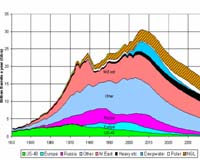 |
Ankara, Turkey (UPI) Aug 11, 2009 Last week's energy deals between Moscow and Ankara have fueled Russia's hopes it can keep its monopoly on gas deliveries from Asia to Europe. The deals, signed by Russian Prime Minister Vladimir Putin and his Turkish counterpart Recep Tayyip Erdogan in Ankara, fortify Turkey's role as a major energy hub. Critics say they also undermine Europe's attempts to reduce the continents energy dependence on Russia. They include an agreement between Erdogan and Putin to have a leg of the South Stream pipeline -- the competition to the EU's Nabucco pipeline -- through its territorial waters in the Black Sea. Russia has in the past months lobbied for South Stream in a bid to torpedo Nabucco, a 2,000-mile pipeline intended to bring 31 billion cubic meters of gas per year from the Caspian Sea to Austria via Turkey, Bulgaria, Romania and Hungary. Turkey, which is a key stakeholder of Nabucco, has now boosted South Stream, a pipeline Moscow says would link the Russian port city of Novorossiysk with Varna, Bulgaria, through the Black Sea, before continuing on to Italy and Austria through the Balkans. Just last month the EU had left Ankara with a package of agreements boosting Nabucco, to which Turkey is a major stakeholder. Putin with his latest visit undermined that success a bit. Earlier this year Gazprom signed agreements with transit states Bulgaria, Greece, Serbia and Italy to speed up South Stream. Moscow says it wants to start building South Stream next year. Italian Prime Minister Silvio Berlusconi has been a big supporter of South Stream, and he was also present in Ankara last week. Turkey has been readily willing to play both the EU and Russia, in a bid to increase its clout as an energy hub. It also tried, in vain, to link the success of Nabucco to its EU accession process, which remains in limbo. Russia is trying to maintain its dominant role as an energy supplier to Europe. It has also launched Nord Stream, a planned 758-mile natural gas pipeline directly linking Russia and Germany under the Baltic Sea, bypassing transit countries in Eastern and Central Europe. It is designed to eventually deliver up to 55 billion cubic meters of gas per year, enough for around 25 million households. Around 80 percent of all Russian gas bound for Europe runs through Soviet-era pipelines in Ukraine, a transit route that has been marred by bilateral conflicts between Moscow and Kiev. Russia aims to circumvent these countries, and also show that projects like Nabucco are strategically and economically unnecessary. In other agreements in Ankara, both sides reiterated their support for a second leg of the Blue Stream pipeline, aimed at reaching markets in the Middle East. Russia and Turkey also agreed to jointly build conventional electric power plants, and reports mentioned a possible cooperation on nuclear energy. Share This Article With Planet Earth
Related Links Powering The World in the 21st Century at Energy-Daily.com
 IEA economist revives peak oil debate
IEA economist revives peak oil debateLondon (UPI) Aug 6, 2009 Is the world running out of oil? A debate that has been going on worldwide for some 50 years, and in the United States for more than 80 years, has been publicly stirred up again by a recent newspaper interview with the chief economist at the International Energy Agency in Paris. Talking to The Independent in London, Fatih Birol says that world crude oil production is set to peak in ... read more |
|
| The content herein, unless otherwise known to be public domain, are Copyright 1995-2009 - SpaceDaily. AFP and UPI Wire Stories are copyright Agence France-Presse and United Press International. ESA Portal Reports are copyright European Space Agency. All NASA sourced material is public domain. Additional copyrights may apply in whole or part to other bona fide parties. Advertising does not imply endorsement,agreement or approval of any opinions, statements or information provided by SpaceDaily on any Web page published or hosted by SpaceDaily. Privacy Statement |